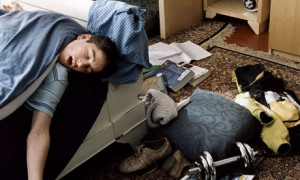Sleep deprivation triggers health concerns in students
By Christina Marder, Staff Writer

Tired teenagers and college students need the required amount of sleep–at least eight hours per night–to accommodate their busy schedules.
Recent studies show sleep deprivation can wreak havoc on adolescents’ physical, emotional and mental health. Studying for exams, writing papers and completing other assignments clutters the schedules of hardworking college students. In addition, students are encouraged to participate in school organizations, such as team sports, writing for the school newspaper, participating in Greek Life or joining an academic honor society. Students that participate in more than one extracurricular on campus receive additional praise, hence why so many attempt to do just that. Hours without homework or meetings are often used idly for catching up on television shows or with friends. Though most students can relate to the feeling of craving sleep as the day drags on, students’ busy schedules and various daily tasks prevents them from succumbing to their fatigue.
Most college students would agree that there just aren’t enough hours in a day. Twenty-four hours is not a sufficient amount of time to complete all the responsibilities of being a young adult and college student. Students are either focused on catching up on work, staying on task with current assignments or even getting ahead. No matter the type or quantity, there is always an assignment to do.
Dr. Brian McCrindle, senior author and cardiologist at SickKids in Toronto, stated, “What happens with [college students] is that they have very poor sleep habits and sleep hygiene, so they’re sleepy and tired and have poor energy during the day, so they hop themselves up on caffeinated beverages and then that just perpetuates their problem…so they get in a cycle.” There is a huge demand for coffee all hours of the day on college campuses. Whether it is iced or hot, vanilla or hazelnut, students attempt to wave off their grogginess with the awakening powers of caffeine. Adolescents generally need about eight to nine hours of sleep per night, however students in college receive more along the lines of six or seven.
It is important to note that ignoring the effects of sleep deprivation and substituting sleep with caffeine can have negative effects on the body. Students may be able to ignore their need for sleep for a day or two, however longer than that would be extremely damaging health-wise. In terms of immediate effects, sleep deprivation will harm normal daytime functions, such as learning and memory. Those not getting enough sleep are also often driven toward eating fatty, fried or high-caloric foods. Furthermore, it has been proven that individuals who do not get the full eight to nine hours are also less physically active and continue to spend more time in front of a computer or a television. Over time, students can get stuck in insufficient sleep cycles which can be hard to break out of.
The message is loud and clear: get some sleep. Students with assignments due, club meetings to attend and other obligations need to stay organized and spend their time wisely. It is okay to put work aside to take even a half-hour nap; the work will still be there when you wake up.
Don’t procrastinate; simply get your work done quickly so that you can get to bed at a normal hour. At least half an hour before going to bed, students should make a point to put away their computers and turn off their phones. Not only will the content stimulate your brain, but the bright screen will keep you awake as well.
Students should keep track of just how much sleep they are getting during the week. It is important that students to improve their sleep habits rather than suffer from their sleep habits. Among other things, sleep is certainly one key to becoming “Gettysburg great.”
